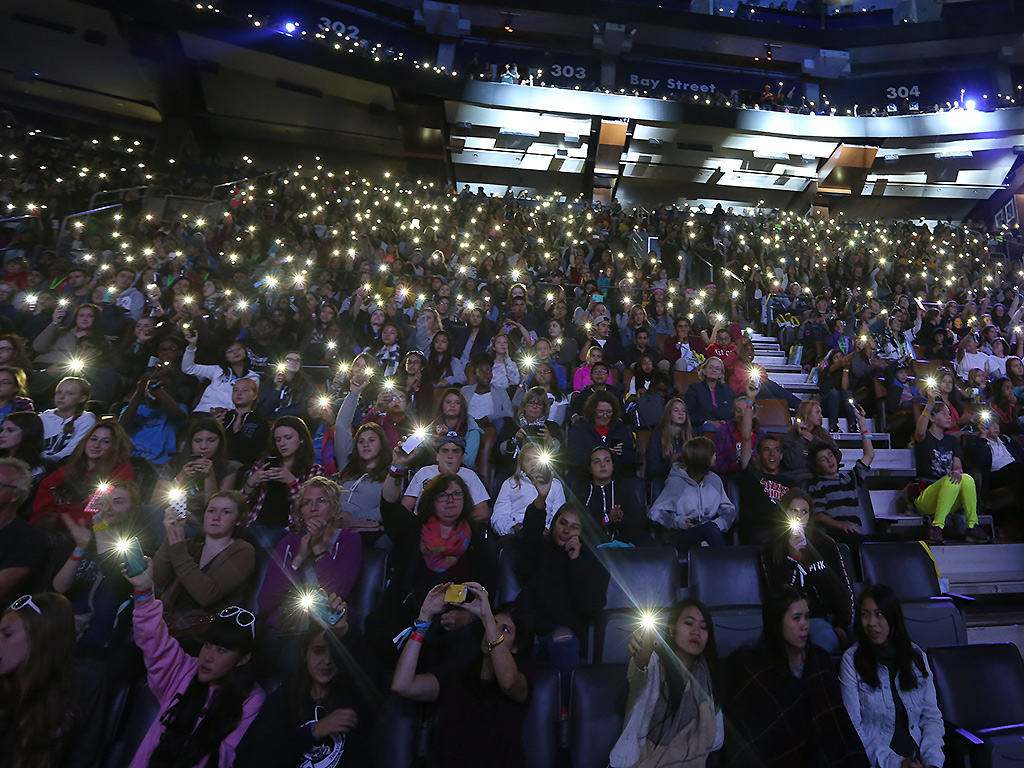After Monday’s shocking attack following an Ariana Grande concert at Manchester Arena, it’s justifiable that people around the world, including Canadians, are scared of what could possibly happen within their borders. More specifically, many are pondering if what happened at the British concert could potentially occur at a Canadian venue.

In the wake of the Manchester bombing and the eerily similar 2015 terrorist attack at the Bataclan in Paris, it only seems natural to question one’s safety at large public events and concerts. It’s a horrific thought to be sure, since the majority of big concerts involve massive crowds, people standing shoulder-to-shoulder, with only a select few ways to get out.
The unfortunate reality is no one is 100 per cent safe, anywhere, and security measures put in place at the concert venue are really the average citizen’s only line of defense. (Those measures in addition to our own luck, due diligence and attention, of course.)
WATCH BELOW: The latest on the Manchester attack
Maple Leaf Sports & Entertainment (MLSE), a professional sports and commercial real estate company that owns both the Maple Leafs’ and Toronto Raptors’ Air Canada Centre (ACC) — one of the biggest concert and sporting venues in the country — wouldn’t comment on its security plans for the future, saying it would be detrimental to the plans’ effectiveness.
MLSE communications coordinator, Melissa Perri, told Global News that the company’s “thoughts and prayers” are with the victims and families affected by the Manchester tragedy, and she explained why they can’t divulge any security specifics.

Get daily National news
“To maintain the integrity of important security procedures at our venues, MLSE does not disclose security details,” said Perri. “But suffice to say that there is continual review of all practices with the relevant authorities to ensure the protection of fans attending events, especially in light of the tragic events at Manchester Arena.”
READ MORE: First Manchester victim identified as Georgina Callander, 18
MLSE did, however, say that it would be upping security on the ground at ACC events going forward.
Dave Haggith, a spokesman for MLSE, said the ACC regularly works with local and national law enforcement to monitor any perceived threats. In recent years, the venue began ramping up security with walk-through metal detectors and bomb-sniffing dogs.
“You’re going to find every venue is at a heightened awareness,” Haggith said to Global News’ Cindy Pom. “Something like the incident that happened yesterday brings a much more public focus to it. MLSE’s security personnel are in constant communication with local, national and international law enforcement and security experts to ensure the protection of our venues and fans.”
READ MORE: Salman Abedi identified as suspected bomber in Manchester attack; here’s what we know
Live Nation Entertainment, an American global entertainment company, owns and operates concert venues around the world and in Canada, including the Commodore Ballroom in Vancouver, and they have a select list of concert safety measures to “get show ready” for concertgoers.
When you venture out into a public space, especially a large gathering, it’s virtually impossible to guarantee your safety, but some of Live Nation’s concert tips are a definite help. They include:
Be available and willing for inspection
Be prepared for an inspection upon entering the venue. Usually this involves (at least) a pat-down and a quick walk through metal detectors. For those with nothing to hide, this is a cakewalk. Don’t waste security officers’ time by being belligerent or difficult. That’s attention that could be spotting potential threats coming in.
Don’t be part of the problem
This goes without saying, but concertgoers shouldn’t be bringing weapons or other illegal items into the venue. Most events don’t allow glass containers or cans, large coolers, laser pointers, fireworks and oversized bags or backpacks, either. Again, security having to deal with your minor infraction draws valuable resources away from possibly serious issues.
READ MORE: Mother makes desperate appeal for information on her missing daughter
Take notice of your surroundings
This one is key, since no one is going to be able to get you out of the venue in an emergency except for you. So before the show starts, make note in your mind about the layout of the concert, the venue, and the nearest exit. This is something you can even research before you head out to the concert.
If you see something, say something
Notify security immediately if something seems out of the ordinary or out of place. Keep your eyes peeled for suspicious-looking bags without an owner. While it might be uncomfortable to mention something to law enforcement or security, think about how much you’ll regret it if you say nothing and something horrible ends up happening.
Because nothing of this nature has happened before in Canada, it’s easy to get a feeling of false safety; with heightened tensions and political turmoil around the world, it’s naive to think Canadians are untouchable. The old adage goes: it’s better to be safe than sorry.
This morning, Manchester police identified 22-year-old Salman Abedi as a suspect in Monday night’s suicide attack, which left 22 dead and injured more than 50 others, many of them children. The so-called Islamic State group (ISIS) claimed responsibility for the attack.
As of this writing, Live Nation Entertainment has not responded to Global News’ requests for comment.
— With files from The Canadian Press




























Comments
Want to discuss? Please read our Commenting Policy first.